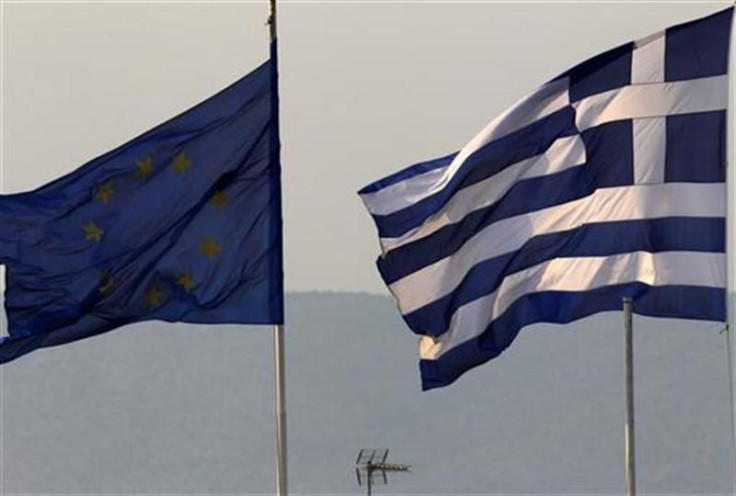Greece Bailout Provides Respite, But No Solution to Debt Crisis: IHS

Eurozone finance ministers have approved the 130 billion euro ($171 billion) bailout package to Greece but this will not be good enough to solve the crisis faced by the country, according to IHS Global Insight.
IHS Global Insight economist Diego Iscaro and Greece Analyst Blanka Kolenikova have stated that the new bailout package means that the probability of Greece facing bankruptcy in March has decreased significantly. Indeed, without further funds, Greece would have been unable to redeem a bond for EUR14.5 billion maturing on 20 March. The agreement is conditional on a successful private debt restructuring and the approval by a number of EU parliaments.
IHS points out that a hard default in March would have probably resulted in a Greek exit from the eurozone, with disastrous consequences for the economy and unknown, but potentially devastating, contagion effects for the rest of the area. Positively, lower interest rates on official loans will also help improve Greece’s debt sustainability, while the ECB’s decision to forgo the profits stemming from its holdings of Greek debt are likely to put Greece in a stronger position when negotiating with private bondholders.
Does this mean that the Greek crisis has been finally solved? Unfortunately, the answer is a categorical no, according to IHS global insight. The first question is whether enough private investors will agree to take part in the debt restructuring. This is not certain, given that a relatively large share of the private debt being negotiated is held by hedge funds and other independent investors, that may not have a strong incentive to take part in the deal. Some reports suggest that the Greek parliament is expected to pass a law obliging all bondholders to take losses.
Although this would ensure a large reduction of Greece’s debts, it will put a further question mark on the voluntary nature of the debt exchange, risking triggering credit default contracts, according to IHS. Moreover, the second bailout means that the proportion of Greek debt held by official institutions will increase significantly, making it more difficult for Greece to attract new investors when it eventually decides to issue new long-term debt.
Iscaro and Kolenikova have noted that the main problem is that after years of economic contraction, the eurozone does not seem to realise that Greece’s problems will not be solved without a strategy for growth. To illustrate this point, it is worrying to see that the Eurogroup statement, comprising more than 1,100 words, only mentioned the word “growth” twice. The economy is immersed in an austerity trap, where fiscal austerity and a deep recession feed each other with dire consequences. The unemployment rate has more than doubled in less than four years (half of Greeks aged between 15 and 24 years are currently out of work), while tax revenues have actually fallen in 2011 despite the draconian austerity measures put in place.
IHS reports that it is undeniable that the country needs to go though structural reforms to achieve sustainable growth rates in the long term. Indeed, the successful implementation of these reforms will be imperative if the country wants to remain in the eurozone. However, structural reforms will take time to bear fruit and it is increasingly clear that without a growth strategy in the short term, the economy will remain in the doldrums for a significant period. With this in the background, it will be extremely difficult for Greece to reduce its large fiscal deficit and meet the targets agreed upon with its official creditors. As a result, tensions are likely to resurge every time Greece has to secure a new tranche of official funds. Moreover, the longer the economy stays in dire straits, the more likely it is that social and political support for reforms will get eroded.
IHS has also pointed that Greek politicians will now concentrate on the snap parliamentary election, expected to be held in April. Surrounded by the pressure of ongoing and unpopular austerity measures and political bickering, the prospects do not look positive, though. Support for the two main parties—centre-left Panhellenic Socialist Movement (PASOK) and conservative New Democracy (ND)—is at a historic low, with the two parties polling around 13 percent and 19 percent, respectively. Meanwhile, smaller leftist parties, which oppose the bailout and harsh austerity, are gaining support among public.
According to the IHS, if the current polls prove true when the general election is held, neither the ND nor the PASOK would secure sufficient support to create a majority government. The winning party would be then forced to team up with smaller, radical parties, which would bring uncertainty and instability, mid-term. A grand coalition between ND and PASOK cannot be ruled out, but is currently unlikely: the two parties, standing on the different sides of the political spectrum, have too many differences to overcome, as was already demonstrated during their short coalition existence in place since late 2011.
In the coming weeks, the government will also have to cope with mounting public opposition to the austerity measures going by the IHS analysis. Earlier this month, riots flared up in the capital, Athens, and other Greek cities, with thousands joining the protest rallies as the Greek lawmakers moved to approve the austerity package required for the bailout deal to be approved. Dozens of buildings were set ablaze and businesses looted. On Sunday (Feb. 19), thousands of demonstrators staged another anti-austerity protest in Athens.
There were reports that demonstrators suffered minor injuries after they clashed with the police, while six people were arrested. Such tension could flare up further as the Greek MPs move to approve the bailout deal and later when they start implementing recently-passed cost-cutting measures.
© Copyright IBTimes 2024. All rights reserved.





















